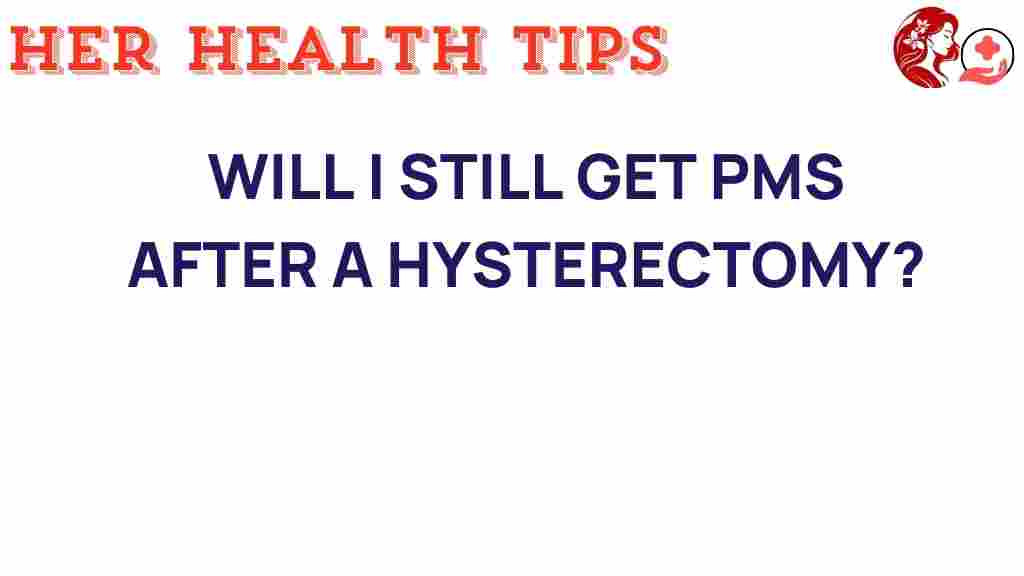Unpacking PMS: Will It Persist After a Hysterectomy?
Premenstrual syndrome (PMS) is a common condition that affects many women during their menstrual cycles. It can cause a range of emotional and physical symptoms, which can be quite disruptive. For women considering or undergoing a hysterectomy, a common question arises: will PMS persist after the surgery? In this article, we will explore how hormonal changes due to surgery can impact women’s health, the relationship between PMS and hysterectomy, and what to expect during the post-operative period.
Understanding PMS and Its Symptoms
PMS encompasses a variety of symptoms that occur in the luteal phase of the menstrual cycle, typically in the week or two before menstruation. Symptoms can include:
- Emotional changes (mood swings, irritability, anxiety)
- Physical symptoms (bloating, breast tenderness, headaches)
- Fatigue and sleep disturbances
- Changes in appetite and cravings
The severity of PMS can vary significantly from one woman to another and may affect daily life, relationships, and overall well-being.
What Is a Hysterectomy?
A hysterectomy is a surgical procedure that involves the removal of the uterus. This surgery is performed for various reasons, including:
- Uterine fibroids
- Endometriosis
- Abnormal uterine bleeding
- Uterine prolapse
- Cancer of the uterus, cervix, or ovaries
In some cases, a hysterectomy may also involve the removal of the ovaries (oophorectomy), which can lead to significant hormonal changes in a woman’s body.
Hormonal Changes After a Hysterectomy
One of the most important aspects to consider regarding a hysterectomy is the hormonal changes that occur afterward. The extent of these changes depends on whether the ovaries are removed during the procedure:
- Hysterectomy without oophorectomy: The ovaries remain intact, which means that they will continue to produce hormones like estrogen and progesterone, potentially allowing for a continuation of the menstrual cycle, albeit in a modified manner.
- Hysterectomy with oophorectomy: If the ovaries are removed, a woman will enter surgical menopause, leading to an abrupt drop in hormone levels. This can result in menopausal symptoms, including hot flashes, vaginal dryness, and mood changes.
The Relationship Between PMS and Hysterectomy
After a hysterectomy, the relationship between PMS and hormonal changes becomes clearer:
- If the ovaries are not removed, PMS symptoms may still occur, although they may be less severe due to the absence of a menstrual cycle.
- If the ovaries are removed, PMS will not persist in the traditional sense, as there will be no menstrual cycle. However, women may experience similar symptoms due to hormonal fluctuations associated with menopause.
Post-Operative Symptoms and Menopause
Understanding the post-operative symptoms following a hysterectomy is crucial for managing expectations and maintaining women’s health:
- Immediate post-operative symptoms: Common symptoms include pain, swelling, and fatigue. These are typical following any major surgery and usually subside within a few weeks.
- Long-term symptoms: Women undergoing oophorectomy may experience symptoms related to menopause, such as:
- Hot flashes
- Night sweats
- Vaginal dryness
- Changes in mood
These symptoms can mimic or even exacerbate PMS-like symptoms, leading to confusion about their origin.
Managing Symptoms After Hysterectomy
To manage symptoms effectively after a hysterectomy, consider the following strategies:
- Hormone Replacement Therapy (HRT): For some women, HRT can alleviate menopausal symptoms and improve quality of life. Discuss with your healthcare provider whether HRT is a suitable option for you.
- Lifestyle Modifications: Regular exercise, a balanced diet, and stress management techniques can help in managing both surgical recovery and hormonal changes.
- Support Groups: Joining a support group can provide emotional support and coping strategies from others who have undergone similar experiences.
Common Concerns and Troubleshooting Tips
Women may have various concerns after a hysterectomy, especially regarding hormonal changes and their effects on health:
- Persistent PMS-like Symptoms: If symptoms such as mood swings or fatigue continue after a hysterectomy, it’s essential to consult a healthcare professional for appropriate management.
- Weight Gain: Changes in metabolism post-surgery can lead to weight gain. Regular exercise and a healthy diet are crucial to managing weight.
- Bone Health: Lower estrogen levels after oophorectomy can affect bone density. Consider discussing bone health with your doctor, including the potential need for supplements or medications.
For more detailed information about managing post-operative symptoms, you can refer to trusted resources such as Women’s Health Organization.
Conclusion
In summary, the question of whether PMS will persist after a hysterectomy largely depends on whether the ovaries are removed during the surgical procedure. For women who retain their ovaries, PMS symptoms may continue in a modified form, while those who undergo oophorectomy may find that similar symptoms emerge due to hormonal changes associated with menopause.
Understanding these dynamics is crucial for women’s health and managing expectations post-surgery. By staying informed and proactive about their health, women can navigate the challenges that may arise after a hysterectomy, ensuring a better quality of life during their recovery and beyond.
For further information about gynecological health and surgery effects, visit Healthline.
This article is in the category Reproductive and created by HerHealthTips Team
